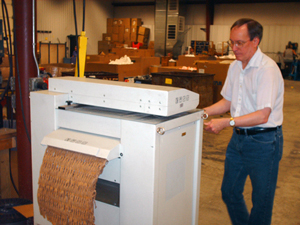
Members | About Workshops | Services for Missourians | News
Dignified and meaningful employment
for people with disabilities
The Key to Missouri's Success: Parents and Guardians

Workshop services provide employment for Missourians and valuable services for local communities.
They are often the founders, directors and even mentors.
Workshops in Missouri were first and foremost the result of parents who saw a critical need for their children with developmental disabilities.
Ron Boney says that critical role is still played by many parents now, just as it was 30 or more years ago. A member of the Clay County Developmental Disabilities Resources Board, a "Senate Bill 40 board," Boney especially gives credit to the "first generation" of parents who built workshops and other services.
"That’s how all of this started," he recalled. "It was the parents wanting services who banded together to get these things started." Evidence can be seen in the continued success of organizations such as The Arc. Indeed, almost every residential, workshop or other programs had its start with a local parent group that saw a need for their children with disabilities.
In fact, a major challenge today involves filling the shoes of these early founders and leaders. "A lot of those people are gone," Boney noted. "We really miss them. Without their efforts we wouldn’t be where we are today. Not only did they have coffee klatches but they also camped out in Jefferson City. They banded together to develop these things."
The almost total absence of services statewide is hard to conceive of 30 years later. "There was nothing," Boney said. "There was no place for them to work. There was no place for them to live."
Boney believes that younger parents must step up to see that they continue. "You can never be satisfied because things can change," he said. "The laws can change and your loved one can be left without any help. We see people who move from out of state and say, ‘You mean there’s not programs for this here?’ They’ve never heard of waiting lists. But a lot of people are content to take the lead."
Leslie Miles is a parent who is also involved with workshops through the independent workman’s compensation group SWIM. Her son, Eric, is seriously handicapped and works at the Lafayette Work Center near St. Louis. She considers workshops a critical options for many.
"My goal for Eric is (for him) to live as independently as possible and have gainful employment," she said. "In my mind, he’s not a candidate for competitive or supported employment. If we didn’t have a facility, a sheltered facility for him, he couldn’t be a benefit to society. He’s earning an income and he’s a consumer. He’s not dependent totally on government income to live."
Miles said the benefits are sometimes subtle but are very real. "He is a much happier person because he’s doing something productive," she said. "He has some behavior problems, but he has fewer behavior problems in the work place. The key for him and a lot of people with disabilities is keeping them busy, making them feel productive and important."
Miles also notes the success of services such as workshops is due to staff members who see their work as more than just a job. "My hat is off to every person working in Extended Employment Sheltered Workshops," she said. "He’s my son, but it’s still hard when he comes home on weekends. I don’t know that I could do their job every day. And if he were not working society would eventually have to find a way to see he’s taken care of. These services are important for everyone."
MASWM The Missouri Association of Sheltered Workshop Managers
If you have questions, please contact:
President Tim Poepsel – (573) 503-0000 or tpoepsel@empacgroupinc.com
or Legislative Chair Kit Brewer – (314) 647-3300 or cbrewer@cuinc.org